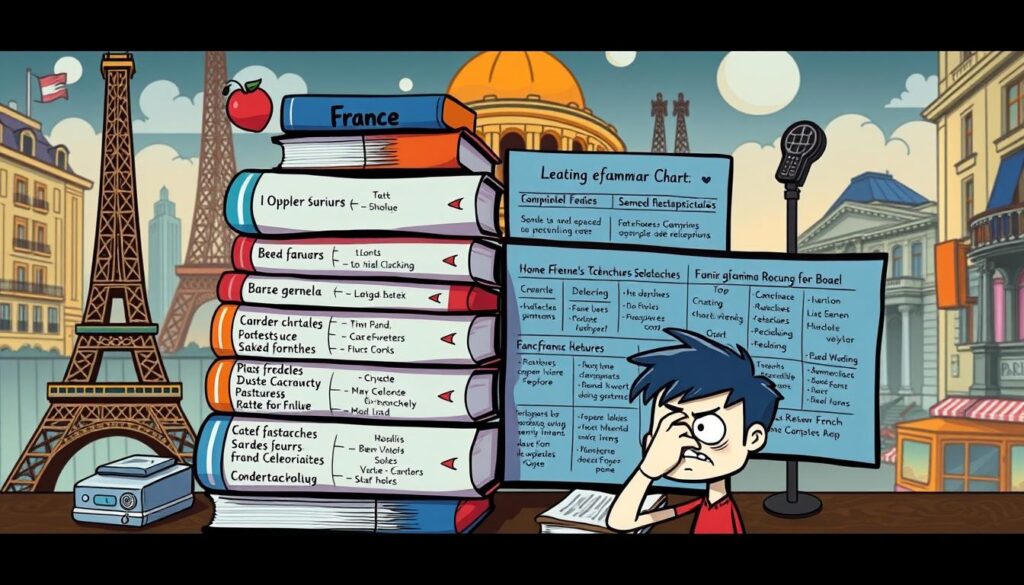If you’re aiming for achieving French B1 proficiency, you’re looking to grasp common topics and manage different situations in French-speaking areas. The path to this level is detailed in the Common European Framework of Reference for Languages, which shows the steps from beginning to B1. But, what determines the French B1 learning duration, and how fast can you progress?
According to statistics, French falls into Category 1. This means a learner might need around 575 hours, or 23 weeks, to become proficient. When considering the time for learn French B1 timeframe, on average, you need about 350-400 hours for good conversational abilities. However, this varies. Factors like your first language, how often you study, and your learning method (immersion or classroom) affect your progress.
For those committed, using a mix of learning tools and practicing regularly can speed up reaching achieving French B1 proficiency. But remember, your journey to B1 could be quicker or slower, depending on many things. Every language journey is unique to the learner.
Understanding French B1 Language Proficiency Timeframe
Reaching the French B1 level is an important milestone towards becoming fluent. At this stage, you can handle travel and daily conversations easily. The Common European Framework of Reference for Languages (CEFR) provides a clear path for learners to reach this level.
The CEFR and the Journey from A1 to B1
Going from A1 to B1 in French is a journey from simple phrases to more complex language. You start with basic grammar and vocabulary at A1 and move to A2. At B1, you learn to manage conversations on your own, marking a key point in learning.
Examining Average Study Hours for B1 Mastery
It typically takes 350 to 400 hours of study to reach B1, as per CEFR. Starting from zero, this sounds tough. But if you’re already at A1 or A2, you might need 150-200 more hours. These hours are for classes, but self-study also helps shorten the time to master French B1.
Factors That Can Accelerate or Extend Your Learning Curve
Your path to B1 fluency in French depends on a few factors. These include how similar French is to your native language, your past learning experiences, and your study environment. Joining French-speaking groups or talking frequently with native speakers helps a lot. Also, using digital tools and French media enhances your understanding and use of the language.
Here’s how different activities can affect your timeline to B1 proficiency:
| Activity | Hours Contributed | Expected Proficiency Contribution |
|---|---|---|
| Classroom Learning | 300 | Fundamental Grammar and Vocabulary |
| Independent Study | 50-100 | Reinforcement and Practical Application |
| Language Immersion | Variable | Rapid Conversational Skill Enhancement |
| Online Tools and Media | 30-50 | Listening and Comprehension Skills |
Committing to daily practice and using the language in different situations is key to moving beyond B1. Learning a language is about quality study time, not just the quantity. Use every chance to speak, write, and think in French. This will boost your B1 fluency faster than you expect.
How Long Does It Take to Learn French B1: A Closer Look
When you start learning French to reach B1 level, you often wonder how fast you can do it. Getting to this level means lots of study, talking, and practice. Even though it might be hard to say exactly how long it will take, looking closer can give us a better idea.
To get to B1 level quickly, studying intensely for about 5 months could work. But, how long it really takes can vary. It depends on your previous language skills, where you’re learning, and your personal strengths.
| Study Hours Required | Level of Proficiency |
|---|---|
| 350 – 490 hours | B1 |
| 530 – 750 hours | B2 |
| 730 – 1050 hours | C1 |
| 1030 – 1450 hours | C2 |
For beginners, picking up basic French might take a few months. But, learning how to pronounce words correctly takes longer and more effort. Also, practicing with native speakers, watching French media, and reading can greatly improve your French skills.
However, spending more time studying French doesn’t always mean you’ll learn it faster. Managing your study time well is key to making steady progress. You want to avoid burnout while learning the language in a balanced way.
The Foreign Services Institute says that English speakers can reach French proficiency in around 575-600 hours. This equals about 23-24 weeks of full-time study. But, if your native language is similar to French, like Italian, you might learn faster.
Realizing these factors that affect how quickly you can learn French shows the need for a tailored learning plan. This plan should have realistic aims and steady effort. Whether you mix French learning into daily life or dive into full immersion, your journey to B1 can be shorter or longer, but always worth it.
Key Factors Affecting Language Learning Duration
The path to French B1 fluency depends on a few key factors. Knowing these can help learners plan their studies better. This ensures efficient progress toward French language proficiency.
Impact of Learner’s Native Language and Prior Linguistic Knowledge
Your first language and any foreign language knowledge greatly impact French learning time. For those who speak languages similar to French, like Spanish or Italian, learning may be quicker. This is because of familiar structures and words.
But, speakers of significantly different languages might need more time. This is due to differences in phonetics and grammar. Romance language speakers, however, have an advantage in learning French faster, thanks to common features.
Role of Immersion vs. Non-immersive Learning Environments
Being in a place where French is the main language spoken changes the game. It forces learners to use French daily, speeding up learning. In contrast, in settings where French isn’t widely used, progress relies on quality instruction and personal effort.
The Significance of Regular Practice and Exposure
Committing to practice French regularly is key for French B1 fluency. Engaging with the language through reading, speaking, listening, or writing solidifies learning. Even short, everyday practice makes a difference. Reviewing and using French in practical situations greatly improves learning.
Understanding these main areas helps learners approach language learning wisely. It matters whether you use your language background, immerse yourself in French, or dedicate time to practice. Tailoring your strategy to your situation can speed up reaching French B1 level.
Strategizing Your Study Approach for French B1 Proficiency
Starting the path to master French B1 needs a deep and thoughtful plan. Think of it as entering a big, rich garden. It’s full of chances but you need to know your way around.
To start, build a strong base of words that go beyond simple talk. Being able to handle different everyday situations in French is key at this level.
Also, you need to get better at grammar. Knowing how to use complex sentences and tenses helps a lot when you learn French B1 effectively. Do grammar drills every day and use what you learn in real life.
Practicing every day is vital. Using the language in all ways – reading, writing, listening, and speaking – helps test and improve your skills:
- Read French books and newspapers to grow your vocabulary and understanding.
- Listen to French shows or podcasts to get used to different ways of speaking.
- Talk with native speakers or use language exchange sites to better your speaking.
- Write essays, even simple ones, to get better at building sentences and making your ideas clear.
Online tools and courses are very helpful, too. They guide you on how to mastering French B1 with well-structured lessons. Using multimedia, like listening tasks and interactive grammar tools, really adds to your learning.
To see how well you’re doing, test yourself often. Exams like the DELF B1 test how good you are and preparing for it makes you focus on all parts of the language:
| Component | Description | Average Preparation Time |
|---|---|---|
| Listening | Understanding daily conversations, radio broadcasts. | 20 hours |
| Reading | Extracting information and discerning opinions from texts. | 20 hours |
| Writing | Producing coherent texts based on personal experiences or opinions. | 20 hours |
| Speaking | Participating in interviews, role-plays, and discussions. | 20 hours |
Consistency and living the language are at the core of learning French B1 effectively. Make your study time feel like you’re immersed in French, with lots of media, talking, and reading. For tips on how to plan your learning, check out LanguaTalk. Every step you take gets you closer to being fluent.
Milestones to Track Your Progress in French B1
When you start learning French, reaching B1 level is a big goal. This level means you can use French on your own in situations you know well. To see how far you’ve come, it’s important to set key goals and celebrate when you reach them. For example, knowing everyday words or being able to have full conversations shows you’re on the right track. Keeping an eye on your improvement in learning French B1 progress helps you grow steadily.
Grasping Core Vocabulary and Grammatical Structures
One of the first steps is getting comfortable with common phrases and important grammar. Moving from a beginner to an intermediate B1 level can take around 350-400 hours of study. This stage includes being able to handle daily communication and understanding French in different settings. Achieving this shows a strong basic understanding of the language.
Achieving Comprehension and Conversational Milestones
As you get better, your goals shift to understanding and speaking more smoothly. You should be able to talk with others easily, without making it hard for native speakers. It takes about 23 weeks or 575-600 hours of practice to reach this level of fluency. Speaking with native speakers, joining programs like “Build a Strong Core,” or listening to French podcasts can really help improve your assessing French B1 level skills.
Utilizing Self-Assessment and Official French Language Tests as Benchmarks
Using self-tests and official exams like the DELF B2 is a great way to see your level. Preparing for these tests usually requires 550-650 hours of study. With the right preparation, such as tutoring and practice exams, reaching your goal level is within reach. These tests not only confirm your hard work but also show what you need to work on. This ensures your study time really pays off by clearly showing your language skills.


